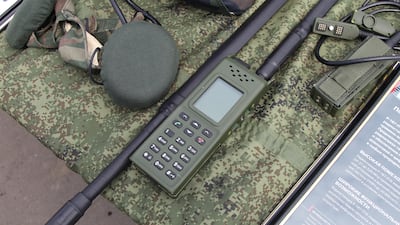Live updates: follow the latest news on Russia-Ukraine
The “serious weaknesses” of Russian radios have probably played a significant role in the stalled Ukraine offensive, leading military analysts have said.
Corruption among Russian military officials may have resulted in troops going to war with too few high-quality encrypted radios or sets fitted with faulty Chinese-made parts, according to a Rusi think tank paper.
Reports from prisoners of war also suggest that Russian officers fearful of being on the front line have withdrawn beyond 18 kilometres radio range of secure sets, forcing soldiers to use mobile phones.
The report’s findings point to “potentially serious weaknesses” in the Russian army allowing communications to be exploited by jamming as well as interception.
Previously Moscow’s military chiefs have remarked on the excellent performance of their latest “sixth generation” Azart tactical military radios, but it appears now that there are either not enough of them or they are inadequate.
“It seems bizarre that units advancing into Ukraine during this dangerous phase of the operation would not be outfitted with the best equipment, including radios, that Russia’s defence industry has to offer,” the report said.
It questioned whether radios were being delivered to the field piecemeal, “or worse, are these new military radios considered substandard?” wrote the authors Sam Cranny-Evans and Thomas Withington.
“That troops may feel more confident using a cheap Chinese hand-held radio would say much about the quality of Russian equipment,” they added.

In the early fighting around Kyiv a captured airborne soldier was found with one of the advanced R-187P Azart radios but this now appears rare. Soldiers have reportedly used Chinese hand-held radios, mobile phones and walkie-talkies that are undermining their ability to speak in secret.
In the last week the Russians have also lost three very senior officers, including two generals, whose precise locations were possibly tracked by their communications vulnerability, although this is not verifiable.
Before invading, commanders ignored communication needs “for the range and scale of operations conducted”, said the report, titled “Russian Comms in Ukraine: A World of Hertz".
“The current operations in Ukraine suggest that Russia does not have as many modern radios in service as it has claimed.”
The intensity of fighting, with western estimates putting Russians killed at 6,000, along with commanders being deliberately targeted by Ukrainian snipers, has apparently led to officers being absent on the front line.

The report quoted from a verified interview of a captured soldier who said: “The officers started stationing themselves further and further away from the fighting … they are out of radio range at this point, and no one can contact them’.
The Russian then explained that shortages in long-range radios had prevented contact with generals commanding the entire invasion.
This had resulted in troops using mobile phones to contact officers and “gain some situational awareness,” said the report.
The London-based institution stated that “one of the most striking images” of the war was the photograph of a civilian's hand-held radio captured from Russian forces. The device is a Chinese-made BaoFeng radio that lacks military-grade encryption.
“Open-source intelligence and Ukrainian reports suggest that radio communications across the Russian forces are poor, leading to makeshift solutions,” the report said.
While not as eye-catching as tanks, guns and helicopters, radios are key to the functioning of armies with clear communications allowing commanders to manoeuvre their troops effectively.
However, Russian-speaking Ukrainians might now be feeding “false or misleading traffic” that is allowing them to “sow disorganisation, doubt and demoralisation” among Russian units. Furthermore, it could allow interception of front line infantry chatter as they go into battle.
The paper also questioned whether Russia’s much revered electronic warfare capabilities had “refrained from a heavier weight of electronic attack to avoid friendly fire against the civilian communications” that their troops rely on.
The report concluded that the “seemingly parlous state” of Russia’s radios had created an opportunity for exploitation by Ukraine.
“While Ukrainian forces may be numerically inferior on the battlefield, they have an opportunity to be superior in the electromagnetic spectrum … Ukrainian forces can exploit Russian networks for intelligence and for battlefield deception.”











































